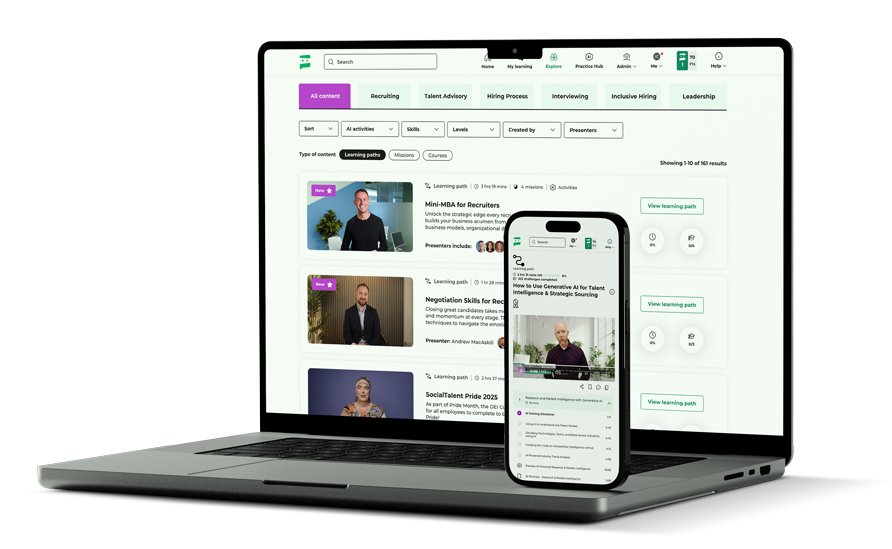
By David Deady
The best recruiters aren’t necessarily the ones who have the biggest budgets or the largest teams. In an environment of constant change and flux, where talent is a premium differentiator for organizations, it’s the recruiters who have optimized their processes and seek to always improve that stand out above the rest.
Recruiting has become a much more strategic and multifaceted role over the years. There are many more complexities, stages, and relationships to maintain in every single hire – and it can quickly become tricky to manage. This is where operational excellence comes into play.

Companies are constantly seeking top talent to drive their success, and finding the right candidates efficiently is paramount. Operational excellence in recruiting is a game-changer, helping organizations to not only attract the best talent but also work smarter by streamlining their hiring processes, reducing costs, improving candidate experience, and enhancing overall productivity.
In essence, it’s a back to basics approach – crossing the Ts so to speak – but many talent acquisition teams struggle with this. Never fear! SocialTalent is here to give you some best practice advice to ensure your recruiting function hums!
What is operational excellence in recruiting?
Operational excellence in recruiting is the practice of optimizing and continuously improving the recruitment process to achieve better outcomes, including the successful hiring of top-notch candidates, reduced time-to-fill positions, and cost savings methodologies. It is a holistic approach that encompasses various elements, like setting clear and achievable goals, tracking data, measuring performance and outcomes, and focusing on good, habitual administrative hygiene practices.
It sounds terribly tedious! And, without gilding the lily, it absolutely can be! But aiming for operational excellence in talent acquisition can make a huge difference in such a crowded and volatile industry like recruiting.
Why is operational excellence so important?
According to research from Josh Bersin, high performing TA teams are six times more likely to make use of data-driven decision making – and these same teams are also three times more likely to supply top talent. There is power in doing the simple things well. When processes run smoothly, stakeholders are aligned, barriers removed, and information is democratized, the impact on the success metrics can be huge. Operationally efficient recruiting teams benefit from:
- Cost Savings: According to SHRM, the average cost per hire in the United States is approximately $4,000. By streamlining recruiting processes and reducing time-to-fill positions, operational excellence can significantly cut these costs.
- Improved Candidate Experience: A seamless and efficient recruitment process not only attracts top talent but also ensures a positive candidate experience, which is essential for a company’s employer brand.
- Faster Time-to-Fill: Vacant positions can hinder a company’s performance. Operational excellence helps reduce the time it takes to fill these positions, promoting business continuity.
- Higher Quality Hires: By implementing best practices and data-driven decision-making, organizations can make more informed hiring choices, resulting in better-suited candidates for their roles.
Operational excellence in practice: Top tips
1. Streamlining the hiring journey
It seems almost redundant to say ‘streamline your hiring process’ but so much of operational excellence comes down to this very task. You must take each individual stage in isolation and critically analyze it. From sourcing and outreach, to screening, interviews, assessments, offers, and onboarding – all of these elements throw up different barriers and challenges, and it can be very easy to shrug these off as ‘normal’ or business as usual. Ask yourself some crucial questions, like:
- Are we sourcing talent in the right areas?
- Do we quickly communicate with candidates and provide appropriate detail?
- Is every interview panel aligned on what good looks like?
- Are we using scorecards and is this data being uploaded and shared clearly?
- Do we understand what skills and attributes are successful in the business?
- Are there delays in getting to the offer stage?
And there are a hundred more questions like this you can dive into, but this is step one – diagnosis. It’s important to remember also that speed isn’t the only goal when it comes to operational excellence. Often, it’s about slowing down and spending more time on processes in order to deliver better quality and more efficiency.
Learn more: The Importance of Recruiter Agility
2. Data-driven decision making
Operational excellence in recruiting hinges on data-driven decision-making. According to Deloitte, 71% of companies see people analytics as a high priority in their organizations. By leveraging data analytics, recruiters can gain valuable insights into their hiring processes, can identify bottlenecks or shortcomings, and make informed choices regarding candidate selection and retention strategies.
The ability to collect and analyze data should be in every recruiter’s repertoire. But remember: collecting data is only relevant if it aligns to the broader business’ goals. So prior to investing time digging into certain metrics, ensure there is compatibility. For example, if there is a problem with employee turnover, then retention and new hire performance data should be your priority. Or if time-to-hire is slow and impacting negatively, you can track the time it takes to move hires between each stage. Arm yourself with this information and feed it back into the hiring process.
3. Efficient applicant tracking systems
The ATS is essentially the nerve center of modern recruitment operations. Its significance lies in its ability to automate and streamline various stages of the hiring process, making it indispensable for organizations looking to maintain operational excellence in recruitment. But to ensure it continues to serve as a linchpin tool, there are a few things you must remember:
- Regularly Update Your ATS: Stay up-to-date with vendor upgrades to ensure your system is running at its best.
- Cleanse Your Database: Periodically review and clean up your candidate database. Remove outdated records to maintain the system’s efficiency.
- Streamline Workflows: Identify any bottlenecks or redundant processes and streamline them to optimize workflows.
- Automate: Automation can significantly reduce manual tasks, such as sending out rejection emails or interview reminders.
- User Training: Ensure that your recruitment team is well-trained in using the ATS effectively. Provide regular training sessions and resources to keep them updated on the system’s features and best practices.
4. Recruiting Training
Knowledge is power, but it is also a tool that can enable improvement. Providing dedicated, relevant recruitment process training can be a huge factor in achieving operational excellence. According to a SocialTalent survey, 88% of organizations are struggling to find talent right now. In order to break through the noise and source these hard-to-fill positions, recruiters must refine their approach. Meaning that traditional methodologies and out-dated knowledge simply won’t be able to find (or entice) a candidate in this climate.
Today’s job market is continually evolving, and it’s the recruiters with the latest strategies, tools, and insights who are staying ahead of the competition. Regular learning should be built into every recruiter’s schedule; at SocialTalent, we recommend at least 30 minutes a week to foster the habit. And training not only gives an opportunity to improve practical skills like candidate communication, interview scheduling, etc., it also ensures every recruiter is on the same foundation, making collaboration and scaling so much easier.
Learn more: The Benefits of Recruiting Training
5. Feedback loops
One of the fundamental principles of operational excellence is the commitment to continuous improvement. In recruiting, this means regularly collecting feedback from candidates, hiring managers, business leaders, and other recruiters to identify areas for enhancement. A survey by Glassdoor found that 53% of candidates believe that the most important factor in a positive experience is regular communication throughout the hiring process. While a Gallup report notes that employees are 3.6 times more likely to do outstanding work when their manager provides daily (vs. annual) feedback. So feedback is important from all angles. It fuels iteration and optimization. Whether you collect this information in surveys or through follow-up meetings, it’s crucial to be open to this guidance and see it as a means for improvement.
Conclusion
Operational excellence in recruiting is a strategic imperative for organizations looking to thrive in today’s competitive talent landscape. By streamlining hiring processes, optimizing applicant tracking systems, embracing data-driven decision-making, providing training, and fostering a culture of continuous improvement, companies can unlock the full potential of their recruitment efforts. Remember: so much of this is about doing the simple, obvious things well!




